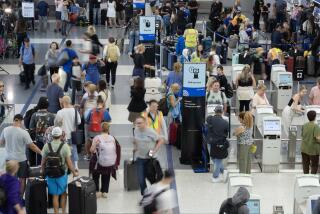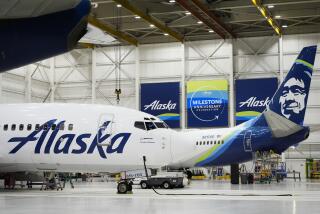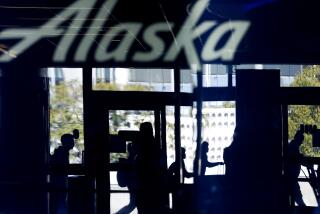Airport Meetings Can Be Lost Cause
- Share via
Multiple choice time: What is an airline’s responsibility to people who wait at airports for passengers to arrive insofar as incoming flights or rerouting is concerned?
A. The airline must tell anyone who asks whether or not passengers had reservations on the incoming or just-arrived flight, whether or not the passengers were rerouted, and what a new flight number or time of arrival may be.
B. The airline has the latitude to decline to answer such a question.
C. The airline, as a matter of service and not government regulation, can permit passengers to phone the airport of arrival or phone the airport of departure.
D. The airline can communicate a message on behalf of rerouted passengers to people awaiting them at the airport on arrival.
The only answer that is not part of the everyday reality of airline operations is A.
While airlines are not required by government rules to answer such questions, they generally will, depending on the airport and the situation. Unfortunately, if airline policies are not implemented properly, the answer may be misleading.
Overbooked Flight
Consider the experience of Shirley T. McDonald of Seal Beach.
At the airport on time for an overbooked flight from Los Angeles International Airport to Monterey, Calif., McDonald was rerouted to another flight that would take her to Monterey by way of San Francisco.
She tried to phone her parents to let them know of the change, but they had already left for the Monterey airport. An airline agent, at McDonald’s urging, did try to reach her parents at the Monterey airport, but was put on hold.
But McDonald had to get to the gate to board her new flight. The airline’s agent told her that she would try to contact her parents or leave a message.
For whatever the reason, McDonald’s parents were not contacted. When her parents asked at the Monterey airport if a McDonald had a reservation on the flight, they were told: “Yes. McDonald did have a reservation on the flight, which just arrived, but she is listed as a no-show.”
Worried, as they would normally have been advised of any change in plans by their daughter, McDonald’s parents promptly called their grandchildren in Seal Beach, Calif.
They were told that McDonald had left for the airport well in advance of the flight. Now McDonald’s parents and her children were concerned.
The upshot was a call to the California Highway Patrol to see whether or not McDonald had been involved in a car accident.
McDonald only learned of this sequence of events after her arrival at the Monterey airport. Ironically, she also asked the airline what the records showed about her flight status and was told she had been a no-show at LAX!
This anxiety-creating scenario, of course, could have been prevented by a more accurate answer from the airline’s personnel.
Up to the Airline
“This is an area that is up to the airlines,” says a Department of Transportation spokesman. “The government has never had jurisdiction over this subject, even before deregulation. While airlines may have good policies in this regard, it’s possible for airline personnel to say one thing but do another, and pass the buck.”
Moreover, the department spokesman adds: “The airlines do have the capability of communicating whether or not an individual was rerouted and on what flight. But it’s up to the airline to do this.”
Explaining how United Airlines handles such a situation, Rod Strickland, director of customer services, says: “The record in the computer is initially accessed by the flight number and then by the name of the passenger. Either a passenger is checked in for a flight or not. But if a passenger isn’t checked in, this is not entered as a no-show.
“If handled properly, a passenger who has been rerouted on United or another airline would have his record revised. Any access to this revised record, either using the original flight number or the new flight number, would then reflect the passenger’s status.”
However, says Strickland, “If an agent starts a totally new record without linking it to the original reservation, anyone looking at the original record could interpret it as a no-show. It’s uncommon for this to happen, though.”
United’s policy, Strickland says, is to let passengers who are denied boarding make a three-minute call, at its expense, to the airport of arrival. The carrier may also phone and page those awaiting the passenger. “If a passenger requests it, we also can leave a message at the airport of arrival.”
Another measure of protection for departing passengers, especially if they don’t have time to contact people awaiting them, is to ask the airline agent if the computer reflects their rerouted status on their original flight reservation.
The system at Delta Airlines is similar.
Call and Telex
“We try to make the phone call for the passenger if he can’t do it himself because of the time factor, and then follow up by telex or phone to our people at the airport of arrival,” says Vince Durocher, district director of marketing for Delta in Los Angeles.
The fact that a passenger was rerouted would also be recorded in the computer, Durocher adds. “Such a passenger wouldn’t be listed as a no-show.”
However, obtaining such information at the airport of arrival may not always be easy. If you phone and ask if someone will be on a specific flight, you will strike out. “This is for security reasons, and for the passenger’s and the airline’s protection,” Durocher says.
Even if you are at the airport, you may face some resistance to getting specific information on why the passenger you were waiting for wasn’t on the flight and when he or she is expected to arrive.
“This is considered confidential information, and it’s generally up to the judgment of the reservation clerk whether or not to release it,” Durocher says.
“It’s basically a fine line of assisting people, which we go out of our way to do, and not violate the rights of passengers,” Strickland says.
The situation is handled similarly with international carriers. “We send a message to the airport of arrival with the names of rerouted passengers and all their flight particulars,” says Jerry Pinola, reservations manager for SAS at LAX.
“We ask passengers if they will be met and for a phone number of such people, who we then call to let them know of the changes.”
But if people are not reached for one reason or another and inquire at the airport, it again becomes a judgment situation on the part of SAS agents, Pinola adds.
If you can’t get reasonable answers at the airport of arrival, ask to speak to a supervisor. Don’t give up. Be prepared to establish, as much as feasible, what is your relationship to the passenger. “We want to feel comfortable with releasing this information,” Durocher says.
Airlines, of course, are not eager to announce overbooked flights. If you are told that the passenger you expected was a no-show, and have reason to doubt it, ask if that flight had been overbooked with passengers rerouted, and if there is a new flight record for the person you are expecting.
Again, if you can’t get answers, ask to speak to a supervisor.
The California Attorney General’s Office tells us that a consumer complaint phone number given in the Travel and You column last week was inaccurate. If you think you have been the victim of a travel scam, call toll-free (800) 952-5225 or write to Office of the Attorney General, Public Inquiry Unit, P.O. Box 944255, Sacramento, Calif. 94244-2550.
Chances are, according to a spokesman, that even if you call you will be asked (by a recorded voice) to put your complaint into writing and mail it to the address above.
More to Read
Sign up for Essential California
The most important California stories and recommendations in your inbox every morning.
You may occasionally receive promotional content from the Los Angeles Times.




![Vista, California-Apri 2, 2025-Hours after undergoing dental surgery a 9-year-old girl was found unresponsive in her home, officials are investigating what caused her death. On March 18, Silvanna Moreno was placed under anesthesia for a dental surgery at Dreamtime Dentistry, a dental facility that "strive[s] to be the premier office for sedation dentistry in Vitsa, CA. (Google Maps)](https://ca-times.brightspotcdn.com/dims4/default/07a58b2/2147483647/strip/true/crop/2016x1344+29+0/resize/840x560!/quality/75/?url=https%3A%2F%2Fcalifornia-times-brightspot.s3.amazonaws.com%2F78%2Ffd%2F9bbf9b62489fa209f9c67df2e472%2Fla-me-dreamtime-dentist-01.jpg)








